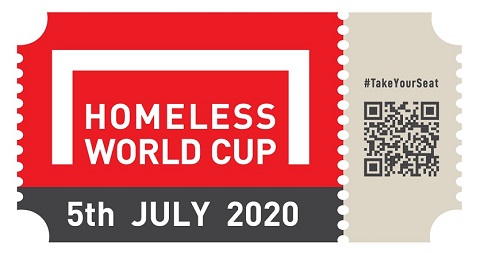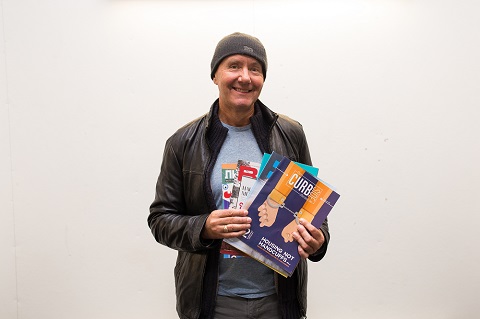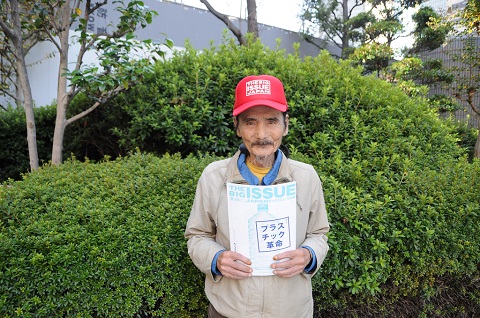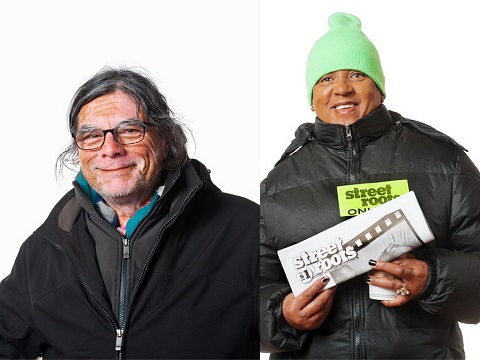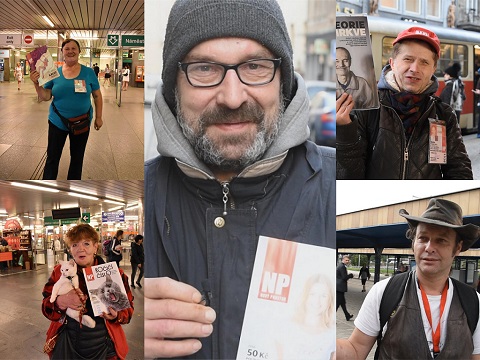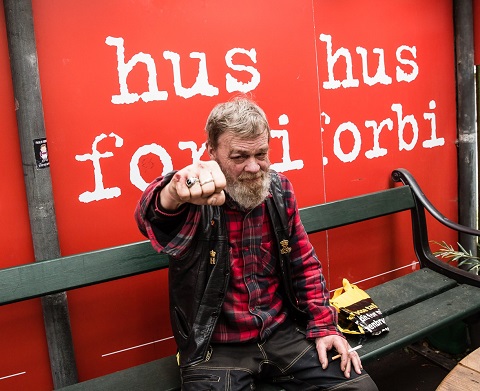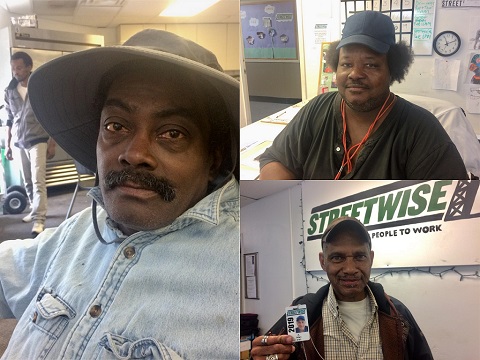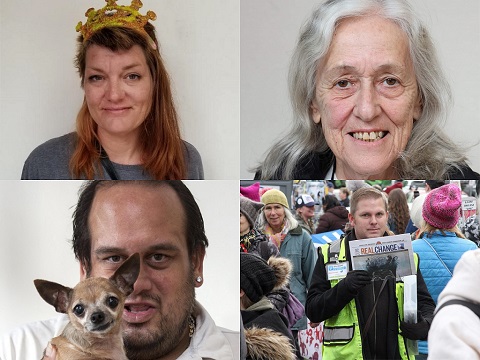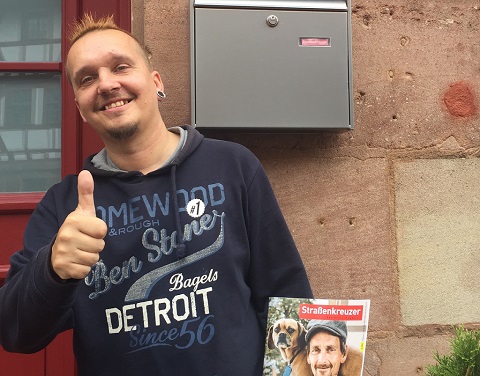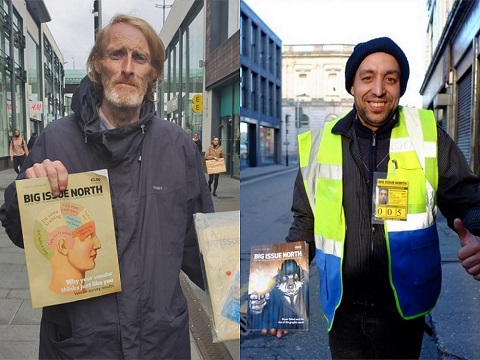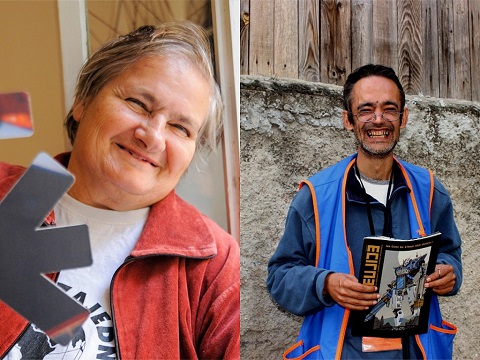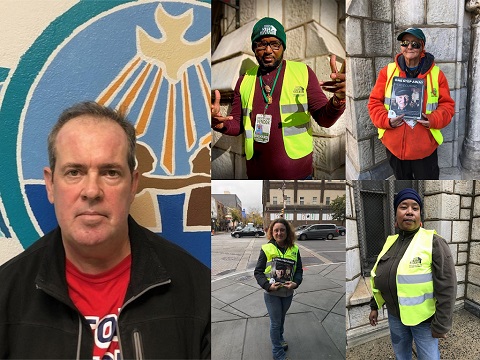On the first day of this year’s Global Street Paper Summit, current INSP chair Fay Selvan was joined in conversation by INSP co-founder, first ever chair, former honorary president, and co-founder of the Homeless World Cup, Mel Young, for a wide-ranging discussion about the past, present and future of the street paper movement as INSP turns 25. The conversation was moderated by Hannele Huhtala, editor-in-chief of Finnish street paper Iso Numero. The full transcript is now available.
Hannele Huhtala: So Mel, how did it all start with INSP?
Mel Young: First of all, it’s fabulous to be here. Thank you for inviting me along. I have not been at an INSP conference for about 10 years. So it’s fantastic to be back, to meet some old friends I haven’t seen for a long time, and to meet some new people, and to experience the energy in the room, which is just fabulous. So it goes back to the early days, because the street papers in the UK had been successful, and the concept was being followed. And so the idea of creating a network where we could all come together appeared. And then some of us made that happen. There was a negative reason as well, because there was particularly one rogue street paper in Europe, who was wandering around and actually making a lot of money – it was a profit driven street paper. And we wanted to create a code of conduct so that our customers could see actually we were united, that we weren’t rogue, and show what we were really about. So that was where the idea came from. The purpose was community but also explaining what our values were.
To come together and to start INSP between us was very difficult. We were very passionate people, and we didn’t agree. We didn’t agree a lot; we were very angry with each other. We weren’t frightened to say what we thought. For example, one of the founding members felt that we shouldn’t have any advertising in our magazines at all. So those were the types of arguments we had, and they were serious. In fact, they were almost physical fights we were having with each other. We would sit up till two or three in the morning trying to solve them. But the overriding conclusion we came to was that it would be this broad church, and it was better to be that, and stronger together, and recognise that we have differences of opinions. That’s the way we started. That’s the basis of it.
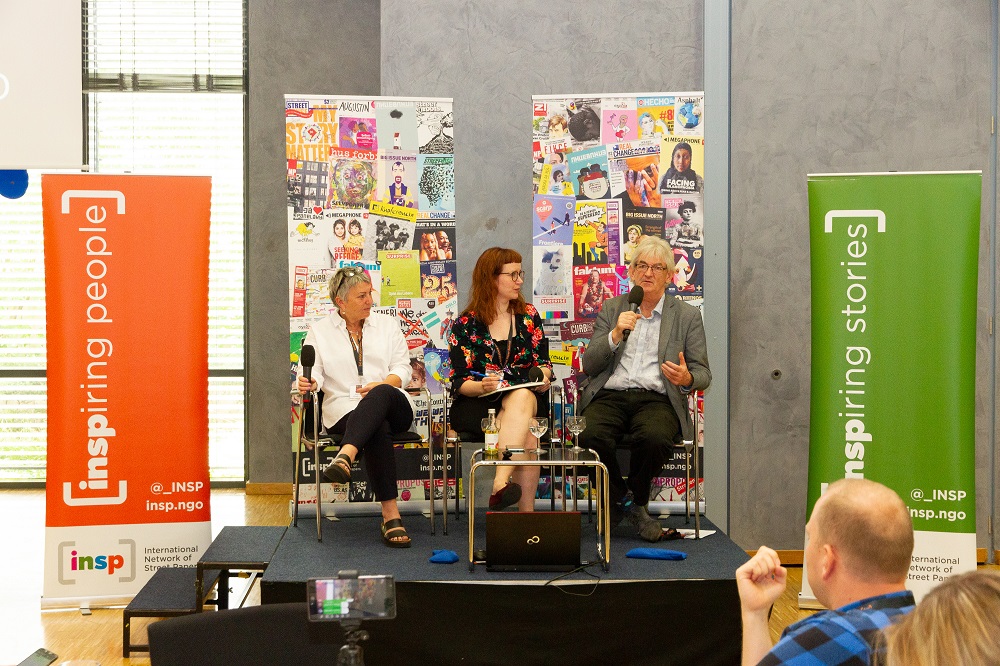
HH: How many magazines were there in the beginning?
MY: I can’t remember, maybe about 8, 9, 10, something like that. UK, France, one I think from the US, Germany, Holland, Portugal.
HH: How about you Fay? When did you come aboard the INSP crew? And what do you remember from the early days?
Fay Selvan: Yeah. So those arguments must’ve gone on a long time Mel, because I went to my first Summit in 2002. It was in Madrid, and I distinctly remember it because I thought “I’m never bloody going back there”. It was so awful. Apologies, it’s not meant as a criticism. But it was everyone, exactly as you said, arguing. And I remember there were a lot of judgements in the room. So, each street paper was judging each other’s street paper and saying, “Oh, well you took advertising from so and so. And that’s not okay”. The annual general meeting I think took a day or something, and there were lots of arguments. So, it was great in the sense that you felt part of a wider network, and you knew that other people were out there struggling with what you were doing, and have similar issues. But at that time, I think it was a bit like we were in the teenage years. We were still in the arguments and saying whatever we weren’t allowed to say in public: “fuck all to the bureaucracy, and to the government,” and everything. It was very revolutionary, and argumentative. And so yes, that’s my first memory. And I didn’t actually go back to a Summit until nearly ten years later, in 2013.
HH: So there were many years in between the first Summit, in 1995, and you attending in 2002. We are calm now, aren’t we?
MY: Yes! Coming here, it’s absolutely amazing. Wonderful people, sitting here, listening, and being very polite. It’s the sign of a mature organisation. So we’ve handed the baton on, and it’s been really developed massively. It’s fantastic. Really fantastic to see. But I think probably we had to go through these arguments actually. We had to go through these discussions. And although they were unpleasant, there was actually a lot of good things going on. We were learning from each other. We were getting to trust one another. One of the important conferences we had, I think it was the second meeting we had, which was in London, somebody came from Russia and explained what the situation was in Russia, which was horrible. And so we agreed that we would support them, all of us, these street papers that were there, and we raised some money, and then we went there, saw that it really was horrible what was happening. And then we had our INSP conference in St. Petersburg, and one evening, we went to the ‘Idiot’ café – that is, for those of you who read Dostoevsky, his cafe. And the delegate from Terre di Mezzo, which was from Milan, in Italy, at the time, he suddenly started shouting, “explosion, explosion”. And this became the word because there was so much energy in the room. It was like an explosion. And we’d gone to this place. And we were forgetting our differences, actually, because there was a unity behind us. And there was a nice explosion of ideas. And so he was standing in this cafe, shouting “explosion, explosion”. And remember are other non-INSP people eating. And so one of the Dutch delegates started talking to them. And he said, “I’m a psychiatric nurse. I’ve taken them for an outing. Don’t worry, they’re my patients”. So this became kind of a running joke for the rest of the conference, which was very funny. I think that kind of moment in the development of INSP’s early days, that meeting in Russia, was actually very important in terms of the journey it’s taken us to get to here.
FS: Can I just add that our whole constitution today is based on exactly the work that you did on the values [back then]. And I agree entirely, still we have heated debate about some things. But I think by going through that period, we’ve learned that we can use the boundaries to make sure we don’t judge each other. We understand each of us is coming from different areas, but we’re on the same mission.
“The people who are the poorest in society, or the people who are most excluded, quite often change. And so we’re like a barometer of social change, and what’s happening in societies. But we’re the constant. We will always offer the opportunity for someone to earn an income outside of the formal world of employment and social security. We’re the real safety net.”
HH: That’s really the essence of INSP. What’s the most unique thing, or what’s the brilliance behind INSP? It’s a big question. How do you see it?
FS: Well, we are unique in what we do around the world, and all of us will have tried to tell someone else what we do, and they don’t get it. So you have to go into the detail of explaining what we do. But I think, since I’ve been involved with Big Issue North, our client group is continually changing, because the people who are the poorest in society, or the people who are most excluded, quite often change. And so we’re like a barometer of social change, and what’s happening in societies. But we’re the constant. We will always offer the opportunity for someone to earn an income outside of the formal world of employment and social security. And so we’re the real safety net. it feels like a real privilege to be part of that, and a real commitment and a passion that we have to make sure this network, and our papers, sustain into the future because no one else is going to do what we’re doing. I guess that’s for me, what makes it so special.
HH: Well, how about the challenges of running the network. Maybe Mel you can say more about the challenges and how they have been solved throughout the years?
MY: I think the challenges, as a network, and one of this scale, is it always had a tiny amount of money, and could really only do so much, which was, at the very least trying to get somewhere in the world where we could all meet together. And it’s very interesting listening to what services INSP offers members, because that’s hugely different and grown. It’s very sophisticated, compared to what it was. So the challenge is simply, I think, just about to scale. All we could really do is actually get together. And back then it was being run out of one of the street papers in Scotland, we were giving the resources to do it, on top of everything else we were doing, to begin with. Which we were happy to do. But then you know, it increases, it has its own centre and so on, and then has to try and raise funds, which it successfully did. So, in terms of INSP as an organisation, that’s the main challenge. I think, in terms of street papers and [how they’re perceived], to the public and governments and so on, now it’s much better as a result of the network. So the network adds value. And that’s good. It’s not just the sum of the parts – it adds value.
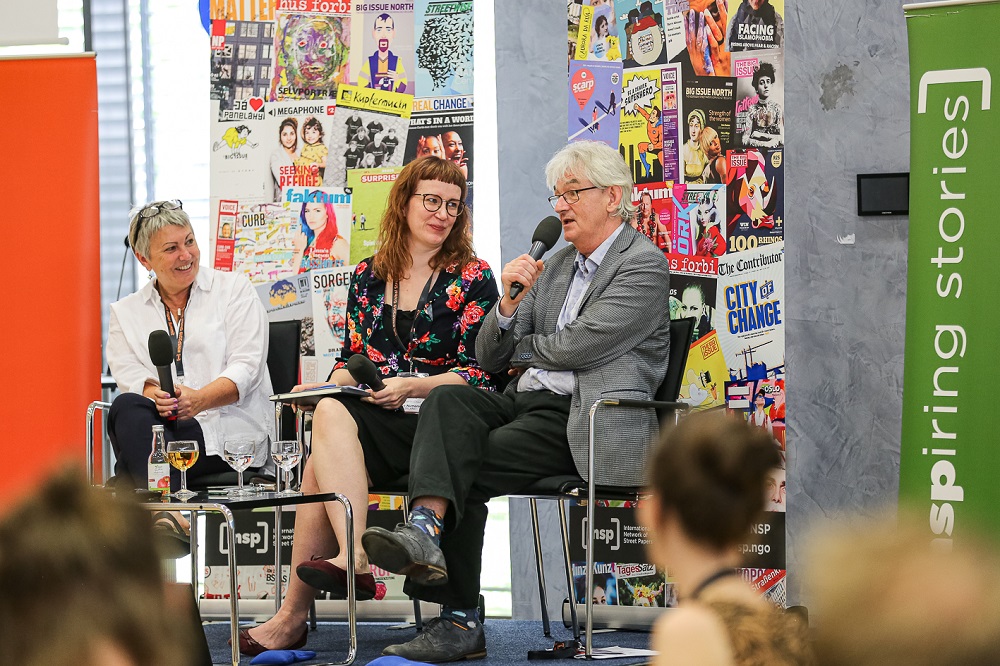
HH: Fay anything to add about the challenges today? You know more about the situation now.
FS: Yes, money is always going to be a challenge. And we have a very small staff team, we do a really big job. I think we’re aided because obviously, as IT has moved on, we’ve been able to move with it. So we can bring in new innovations like Salesforce, which helps us understand our membership more, and who’s doing what, and using what of our services. But also things like the INSP Hub, which means that we can share resources better. So we’ve been able to utilise those. But there’s always going to be the challenge of the network and funding the network. So currently about a third of our income comes from the members. And most of that comes from a small handful of the larger street papers. But I think that’s really important, because I think that the network’s always been about the street papers supporting themselves and supporting each other. And the more established papers supporting, the less established, but also the other way around. Because the sharing of stories [editorial content] is really useful. We get the whole international experience.
In terms of challenges for street papers, we talk about it every year, the same issues: cashless payments and areas of decline. But one of the good things about being older is that you see things happen, and see the history of them. I’m ashamed to say when I first started work, we didn’t have mobile phones, and we didn’t have computers, we had typewriters where you typed and pressed return, that was the height of technology. But I also remember the time when everyone said cinemas were all going to shut down because we’re all going to have videos. And actually, they haven’t shut down because cinemas provide a social focus and a social coming together. And I think that that’s the thing that the street paper movement does. It’s that we provide a social connection between people who want to do good and people who are in need, who are also helping themselves. So it’s not a begging relationship, it’s a contractual relationship. And I think that’s something that we need to really make sure we are constantly focusing on, because that social relationship is what will keep us going – it’s the unique thing that we have to offer. And I think as a network, we can be creative about using new technologies and new ways of working and sharing them between us. But the social connection is the thing we need to make sure we’re communicating on.
HH: I want you to both answer this question because I know there is still a lot of diversity between the magazines and some disagreements still going on. What is your view on that, that all street papers are aiming for a greater good and yet it’s still so difficult to work together? Even though everybody’s wanting the best for everyone?
MY: I mean, I think it’s very simple. We just work in very different cultural situations. They’re all different but you are applying the same essence. And therefore, sometimes it makes it difficult for us to work together as a result of that. But it doesn’t stop us understanding, or appreciating, the different cultures that we’re working in. I’ve been in the US for quite a while now and what’s happening there, how homelessness manifests itself there, is different from how it manifests itself in Europe. And how the government reacts to that is different, and so how a street paper operates in that environment is slightly different.
“I remember the time when everyone said cinemas were all going to shut down because we’re all going to have videos. And actually, they haven’t shut down because cinemas provide a social focus and a social coming together. And I think that that’s the thing that the street paper movement does. It’s that we provide a social connection between people who want to do good and people who are in need, who are also helping themselves.”
And then the second area, I think it’s probably just a very practical one. You come to these conferences, and I’m sure this will happen, everyone goes away and says “I’ll be right back in touch with you and we’ll do X, Y and Z together”, and then you don’t, because actually we’ve all got really small staff and you go back and there’s so many things facing you and very quickly those things from the conference slide to the bottom. So there’s an issue just about our capacity to be able to work together, even if we do want to align with the culture. But I would have to say I wouldn’t go on about it too much. Because I think what’s happening through INSP, this collaboration around street papers, it’s really come on. There’s lots going on. Since I got here yesterday, the stuff that’s going on, which has been coordinated by INSP, it’s really excellent. So there’s lots going on, and it’s certainly not all bad.
FS: I think it’s because we’re all passionate. We all really want to make this work. So, you know, it’s hard not to think our way of doing it is the right way. And I learned that myself. But I think we have now got to the place where we understand that you can’t impose on someone else you’re way of doing things and I suppose it’s part of us all growing up together, and understanding that diversity is a good thing. And actually, if we have different ways of doing things in different areas, that’s a good thing. It does respond to the local circumstances. But it also might mean that at a later stage, we can pinch things from each other that might be relevant to changing circumstances where we are. And I think it is one of the things that occasionally the magazines that are more voluntary may see the magazines that are more business-like as more corporate, and you know that those arguments still go on, and that’s a good thing. Let’s have that conversation. You know, let’s have the conversation about whether vendors should be running the boards of street papers or whether they should be on the board at all. Those are conversations we need to have. Because we can learn from each other. And that’s the reality of where we are. We’re not hiding the fact we do things differently. I think we need to just make sure that we’re having those conversations in a respectful way, which means that we can learn from each other and adopt different practices. And I think that is what is enshrined in the values now and in the principles, that so long as we are ensuring that vendors benefit, and we’re behaving in a certain way, we are an effective network.
HH: Let’s talk about your life outside INSP. What does it mean to you personally?
MY: For me, on a personal level, it’s just a fantastic organisation. To come here and to be one of the founders, and to see it as it is today is just…wow, it’s fantastic. I feel immense pride. I think what’s happened is we’ve created something and we’ve passed the baton on to other people, and it’s not just that they’ve it taken on, they’ve made it grow and develop. And so it continues. Although I’m not involved now, anytime I’m doing talks or talking to people, I always talk about INSP and what is and what a great network is. And it’s an exemplar, actually, for what should be happening in other parts of the world in other areas. Because I’m a firm believer that if we come up with a solution to something, then you need to share that globally. And there are other charities or NGOs that don’t do that. INSP is an example of something that, where there is sharing going on, is creating that kind of explosion of activity around the world. So it means a lot to me, and it’s very nice to be back.
FS: Well, I’m very proud to be on the board of INSP. It is quite a big task. But it is a great team to work with, both the staff team and with the board members themselves. And I’ve made some really good friends doing this. I can honestly say it’s been a real privilege, and something I’m very proud of, and I tell people about. It’s just another opportunity to talk to people about what the street paper movement is, because they might know their street paper where they are, but they won’t understand that it is an international movement, and the great work that we do.
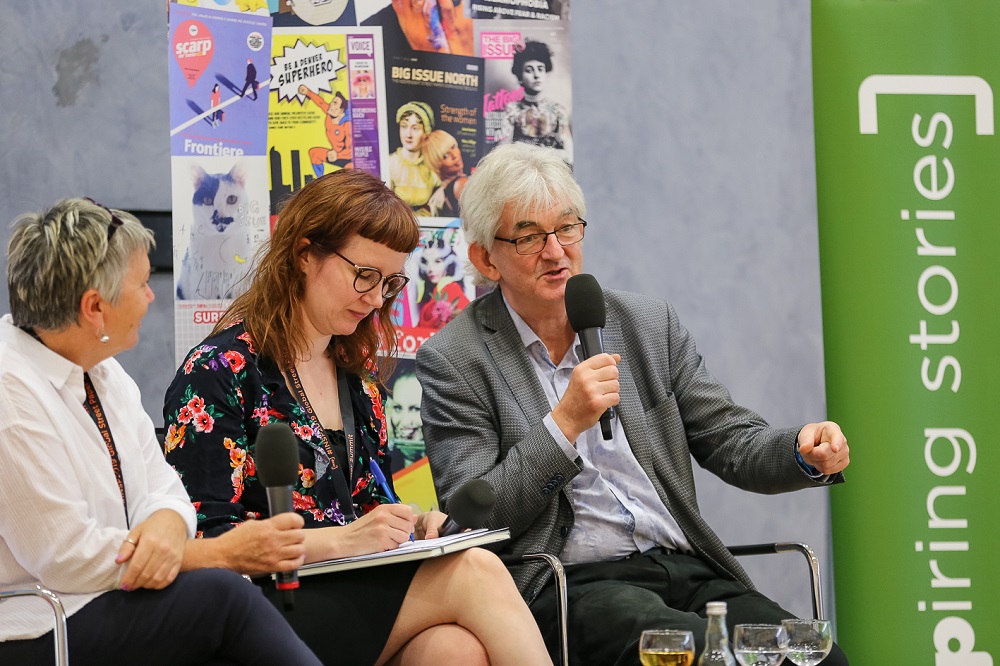
HH: Street papers work in society, and there are a lot of different societal movements happening right now. How do you see that affecting street papers?
FS: I think in the UK, Brexit is particularly impacting the Roma vendors, who have come to the UK to earn an income and live a better life. There’s a lot of uncertainty. I’m going to do an unashamed plug here. We have a podcast called Anon. One of our Roma vendors talks about her experience of coming to Britain and selling Big Issue North and then moving into work and what she felt on the day of the referendum. She’s bringing up two children, both in education, and one wants to be a nurse. One day her daughter came home and said: “Does this mean I can’t be a nurse anymore?”. There’s a real rejection that she felt, as many European people feel, living in the UK. It’s a real feeling of rejection by – I would say British, but I’m in the company of Scottish people here. And so that’s been really difficult. We’ve been doing a lot of work to try and support our non-English vendors to be able to stay in the UK, to get the documents that they require. So it’s required us to change our work slightly. But it could have a big impact, if they all decide to leave. The other issue is the general xenophobia, rising populism and anti-poor people climate in which we are living, which Brexit has contributed to. I used to laugh at Americans for having Donald Trump as their president. But I’m no longer able to do that, because I think we are likely to have a prime minister who is even more laughable, but also as scary in terms of their ability to not only disrespect people who are different, but to particularly undermine their rights. We have pressures on the Human Rights Act, we may be opting out of that, which is just shocking. In 2019, we have, for the first time in the UK, I have to tell you this statistic – we have infant mortality reversing. For the first time, in probably a century, more babies are dying in the first year of life than any other year. So it’s getting worse; that’s how bad it is in the UK. I think we’ve got a lot of challenges.
MY: So, first of all, I think Brexit is an absolute disaster. Full stop. I am from Scotland, and there everyone seems to be against it. So the possible breakup of the UK becomes a reality, actually, I think in the not too distant future. Scotland wants to stay part of Europe. The second thing I would say would be to echo Fay’s point. I think it’s just part of something wider that’s going on across Europe and the world. It’s something I think we, as street papers, because we work with homeless people and people in poverty, are going to have to stand up and fight about. Because there’s two clear ideologies emerging. One involves Brexit, and the President of the United States, and that type of ideology, which is racist, sexist, against a society, that we’re trying to create, which is inclusive. And we saw last night, at the exhibition, which I thought was pretty moving, but I think, pertinent, where we saw what happened in the 1930s, in Germany, when homeless people were made criminals, and you can see some people talking along those lines around the place that are, luckily at the moment, still at the margins. So, I believe that we all have got a very important role to stand up now and work together against this type of ideology. And Brexit is just a manifestation of that. I think the third point, I would probably say, with regards to street papers generally, is the issue of journalism, and what is news that people can trust. This is very important. People are not trusting news sources anymore, and people have begun believing propaganda. What is written in street papers actually is very important. We talk a lot about our vendors, correctly. Of course, that’s why we’re here. But actually what’s written in a newspaper, a street paper, what we’re talking about, within this kind of movement, I think, is equally important. Probably more important than ever. And we should be supporting one another. In discussions earlier, I was listening to people talking about the attitude of the police towards homeless people. We should all be collaborating together reporting these facts. And to our journalism industry, freedom of speech is more important than ever.
“To come here and to be one of the founders, and to see it as it is today is just…wow, it’s fantastic. I feel immense pride. I think what’s happened is we’ve created something and we’ve passed the baton on to other people, and it’s not just that they’ve it taken on, they’ve made it grow and develop.”
HH: that makes me think about the fact that some newspapers are organising demonstrations, promoting stuff. Nordic magazines are more doing investigative journalism. Which of those do you think we should place more importance on. Should street papers actually be organising demonstrations?
MY: I’m probably not on the side of organising demonstrations. Not that I’m against it, people should demonstrate if they want to. And its effective. But I think we, as street papers, what we should concentrate on, actually, is the street paper itself. Talking about street paper sales going down and changes – I think the sales will start to go back up again, particularly if there’s good journalism there, because people will come looking for that. So my belief would be to do good investigative stories. There’s so much to write about in terms of other social enterprises that are going on in different spheres that are really positive. All sorts of things from people that, like yourselves sitting here, are doing other things that need some exposure. I’ve been talking about constructive ways forward, rather than demonstrating. As I say, I’m not against it, I just think the role of street papers is to provide a voice. It’s supposed to be authentic, in terms of its reporting, and its journalism. And that’s incredibly important.
FS: I kind of agree with that really – there’s a time and place. Around 2007, the police and the council in Liverpool decided to arrest all our vendors in the city on the grounds that they were selling drugs, which actually they weren’t, though they were drug users, so they would have some personal use drugs on them. And so they arrested them all – it was a big publicity campaign to basically show they were doing something [about the drug problem]. And then they banned all our vendors from selling on the streets. So it was a really difficult time. And of course, we then went into full campaign mode, because we’re actually defending the rights of our vendors directly to sell the magazine. And on that one, we had no choice. In my view, we had to be out there, doing multiple things, but one of them was going to the courts and trying to get an injunction against them. One of them was going to all our supporters. I think you have to use all the resources that you have available. But I think it’s really important for us, perhaps not in other papers elsewhere, that we are able to be clear about what our line is, and facilitate the debate and the discussion. And to be able to make the case very clearly. And that’s better done, for us, through social media campaigns or campaigns in the magazine, rather than through getting people out on the streets. We may at times support other campaigns, or work jointly with other people around campaigns about homelessness, but not directly through street campaigning.
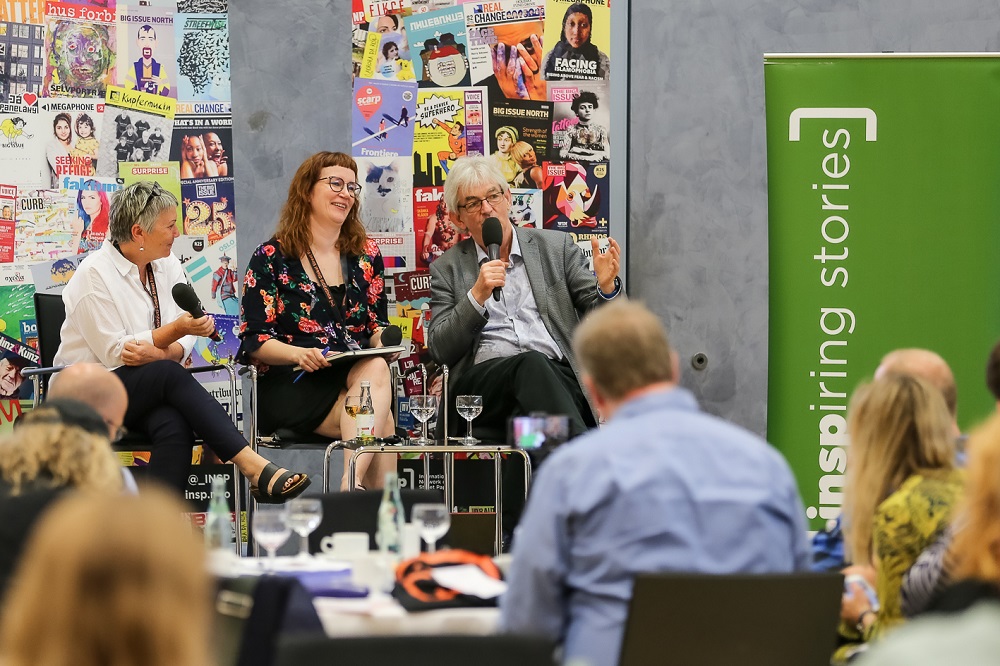
HH: There’s evidently not just one way to do things. And it’s not just the way the world is changing with regards fake news and populism that is affecting street papers. There’s also changing attitudes towards paying for journalism. How do you see the situation with regards to street paper sales changing going forward?
FS: It’s definitely a challenging time, because it’s not just trends. It’s also the way people shop. People more often shop online, so the city centres are becoming less populated, where people go to shop in retail units – you don’t have the footfall. The opening of malls is having a big impact in the UK too, which are privately owned, so it’s difficult to get vendors in them. I do think that the fact we’re independent journalism, and there’s a social connection directly to the person who receives the paper, that’s what will get people to keep buying these magazines. We just need to innovate and keep changing how we get our vendors into the places where they can keep connecting with people.
MY: I’m not so close to it anymore. When I left street papers many years ago now, things like contactless payments didn’t exist. But I agree with Fay. The beauty of the street paper is where it’s being sold – on the street. It’s not going to be in a shop with lots of other magazines. So you’re in this space. And I think it’s just a question of innovating to whatever the situation is with the technology that’s around, changing shopping patterns or whatever. And actually, from experience, you guys are pretty smart, so you can share what works with each other. But I do think it’s about just staying true to the principles of the street paper movement, which is what it’s about. It’s about that relationship with vendor selling, and it’s about good journalism. I think that there’s a gap in the market if you like – if you wanted to put it in strict business terms – for good journalism, because there isn’t much of that around. So you can do that, and tell stories about what’s going on in the sector, about homelessness and poverty. If you look at the trends, amongst younger people in particular, they are very passionate about climate change [and social issues like this], for example. So it’s not all doom and gloom out there. Despite the fact that there’s some politicians who don’t care, there are these other people in the world, and they are much more likely to be street paper buyers of the future. I wouldn’t be pessimistic at all, I think it’s just a question of keeping on doing what we’re doing, innovating, and being smart in the market.
“I believe that, as street papers, we all have a very important role to stand up now and work together against the type of ideology that has manifested itself as Brexit.”
The most important thing we need to be talking about is ending homelessness. So, that means putting ourselves out of business. Because actually, we won’t have any sellers [if that happens]. But the situation, unfortunately, is that, you know, I started working [in street papers] in 1993, and we’ve had huge successes in terms of people not being homeless anymore and starting the Homeless World Cup, which has also been hugely successful. But there are still millions of homeless people coming onto the streets all the time. So how are we going to stop that? There’s a systemic failure that’s going on. And collectively we need to be talking about what it is that stops that happening. How are we influencing government? What are the system changes that are required to happen in our society globally that are going to stop people from becoming homeless? I think that is a discussion point that an organisation like this should be having. We should be thinking about it in our editorials, and talking to governments and businesses, about how we can actually end homelessness altogether, and put ourselves out of business. It’s not necessarily so good having that in the business plan really. But it’s not going to happen tomorrow, unfortunately. But maybe that’s what we should be aiming at.
HH: That’s a high target. But what do you see as the biggest achievements so far for INSP?
MY: I mean, for me, the biggest achievement is everybody sitting here right now. It’s everybody, who has come from all over the world, from all of these countries, all of these papers – it’s an absolutely massive achievement. And everybody deserves huge applause for this because I know how hard it is to go the 364 days of the year, to get here, to this day. It’s just massively hard work. So the fact that everybody’s here, and INSP has facilitated getting people together, so that we can support one another, have these two, three days where we can celebrate with one another and hug each other, and so on, is just really, really important. And so, to me, this is a major achievement, which has been achieved not by one person or two people, but by everybody. It’s one of the things that I believe of this network: the more you put in, the more you get out. That’s true. So you can be a passive member for a while and not do anything. And that’s fine. But for sure if you start putting into this network, it will give you back, and then the network will grow. And that’s what’s happening. That’s the achievement. That’s what’s happening here and will continue to happen.
FS: I agree with that entirely. I suppose the thing that I think about is that, over the years, we’ve had some great challenges and shown some real resilience, and that is a real achievement of the network. Innovating as a network too, on things like cashless payments and trying things and sharing examples of good practice, like digital magazines. There’s been some really good pieces of work we’ve done to help each other be sustainable, but also to help new magazines and see new magazines open. That’s fantastic. Even this year we’ve had some new members. So that’s just brilliant. It shows that we are a vibrant, growing relevant network 25 years on. That is a great thing to achieve in itself.
HH: What has surprised you – maybe more concrete things about magazines – from over the years?
FS: I was always surprised about how different we operated and how different our environments were. But then how similar at the same time. It’s an odd connection that we have together. We can come from around the world, and many of us are still, perhaps because of the economic changes and the climate changes, all affected by the migration question. And all of us are affected by the rise of populism. And whether it be in Brazil or Europe or America, you know, we’re all challenging or fighting with those same issues. And so, in some ways, it’s a great comfort, because you feel like you’re not alone. I think it was the Danish who have been fighting the whole anti-homeless laws and the fining of beggars – when you hear that, you see it also happening in the UK. And you feel like, okay, we’re not alone, we’re fighting this together, we’re all in the same battle. And when we’re so different, that is a bit of a surprise, in some ways, but also a good thing.
MY: I think in the early days, I was surprised at how little sleep delegates would get for days on end, and then managed to still be coherent the next day! But really, I think it’s just the sheer breadth of what we’re doing that’s surprising. It’s really about resilience. I think one of the things that’s really nice – it’s not surprising, I don’t think – is how many new faces there are here. There’s a lot of the same papers, but new people. So what’s happened is people have come to a Summit and then gone and recommended it and other people have taken it on. And so therefore, it’s not about the people per se, it’s actually about their magazines – the magazines have survived, and will continue to survive. And that’s a very good sign, I think, in the same way this organisation is changed. I think really should go to the staff of INSP, because I know that it’s a tiny staff for the work that they do. But no surprises as such. I guess, I’ve been thinking, that one of the things I might say was a little disappointing, is that there are no new street papers coming out of Africa. We also still have massive challenges in countries like Russia. And so while this is great, we should be thinking about what’s going on there. Can we take the initiative in these areas of the world where we’re not represented? We need to be talking about diversity and things like that. It’s not a criticism, it’s just a sign that there’s lots more to do.
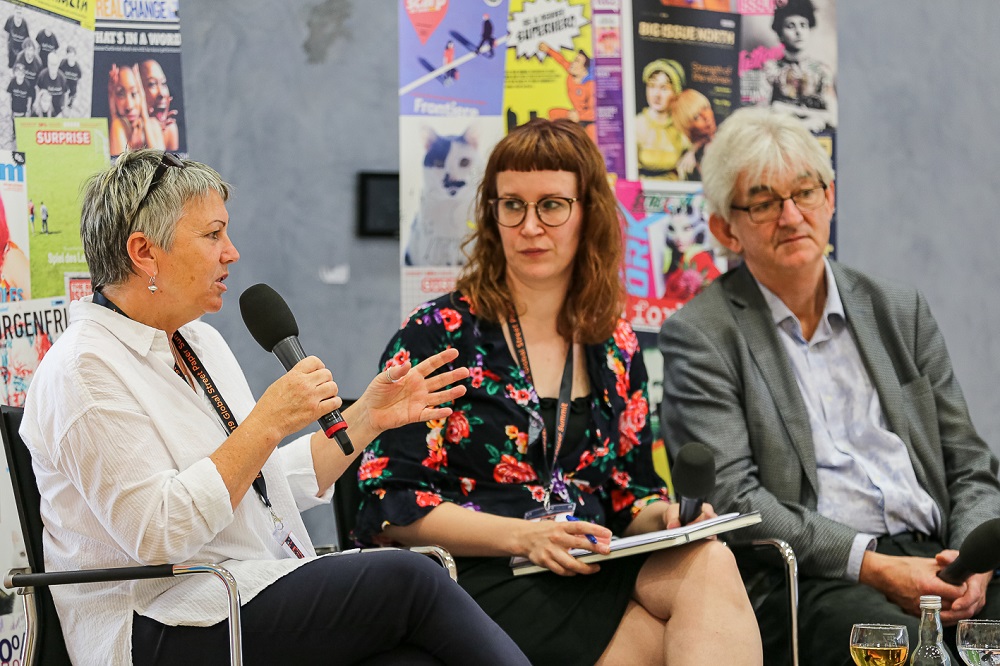
HH: I want to ask a personal question from both of you. You have both been working with the realities of homelessness for a long time. What are your personal coping mechanisms? How do you survive? How do you continue to work? I know that life is a lot harder for people who are actually vendors on the street – so without compromising that – but it’s hard to see the realities day after day.
FS: I don’t work on the front lines anymore. A lot of our staff who do work on the front line are a lot closer to that than I am. Obviously, in my career I have, but not currently. But I think even so, it can be hard to cope with the relentlessness of it sometimes. In the UK, there was about five years there where we had a lot of investment into trying to eradicate homelessness. And actually, we almost did it really. And then with the onset of the recession, we had a massive rise again. Now I’m not saying that we eradicated poverty and all of those things. But it was just that the rough sleeping, that we had seen previously, had kind of gone. And we are now back in a full scale housing crisis with terrible rough sleeping and the biggest numbers of deaths on the streets that have been recorded. And because it happened again, I kept getting asked to come out and talk about how can we eradicate homelessness, like it’s a new thing. And I was furious. And sometimes it’s really hard not to be furious. I recently did a talk and somebody said to me “why aren’t we outraged?” and I said “I am outraged!” And I think sometimes we just have to show our outrage and be able to talk about it, fight for what we want, and be very clear about that. And be clear about how emotionally we feel about it. Personally, I’m lucky. I have friends I can go and talk to. I like to do things that make me feel that I can reflect and have time to myself. Looking after yourself is really important. And we say that to all of our staff. And there’s a great session on at the Summit on helping our staff to look after themselves. Because we all know that in order to help others, you have to feel well yourself. And as street papers, it’s our duty to make sure that our staff are well supported to do their jobs.
MY: Certainly in the early days working with homeless people was very hard. I remember one week when three of our vendors, who were young, killed themselves one after the other. And for myself and the staff, it was very hard, to the point that we almost stopped. It was very difficult. but as one matures and grows up in the organisation, you develop ways in which you can deal with this, because it’s always hard, it doesn’t go away. When you work in this space it can be relentless. You can maybe sort something out [to cope with this], and then one day is a good day, and the next is not so good. Probably the thing that’s more depressing than some of the drama that goes on for these guys is just this continuum of the systems that means homeless people remain on the street. It’s debilitating. It just doesn’t stop. It’s like a tap that just won’t turn it off. And then we have to deal with the problems thereafter. And I think that’s the area we need to focus on. But I’m here and happy, and there’s no need to get depressed, because there’s so much to celebrate.
HH: That’s true. The Homeless World Cup was an idea that came from the INSP Summit. What do you see as being the next big idea, what do you want to see?
MY: I don’t know. But for those of you don’t know, the Homeless World Cup was born out of an INSP conference in 2001, in Cape Town, when me and the head of the street paper in Graz were having a beer. And then the first one was held in Austria in 2003. The teams that were representing their country were coming exclusively, at that time, from street papers. So the Homeless World Cup is really a baby of INSP. I don’t know the answer to your question. And maybe people have to go to the bar and have a beer for us to find out. But really if you look at that, and people will laugh at the story, of us having a beer, but those types of conversations are where ideas come from. But you can have these discussions and they just stay in the bar. The critical thing that happened for us, was the next day we met and said “will we do this?” And the answer was “yeah, let’s do it”. So that was the critical moment – not in the bar but at breakfast. And then we made it happen. There are some great discussions. It’s a question of capturing them and making them happen. So I can’t answer your question. But I’d be pretty sure that a whole lot of positive constructive things can emerge out of a conference like this.
HH: Now we’re celebrating 25 years of INSP. What’s your view of the next 25 years? What does the future look like?
FS: I’m absolutely sure we will exist in some form or other unfortunately, because I don’t think we’d have eradicated homelessness and poverty, or, as we might all aim for or wish, to have a more equal society where people are not left behind. Obviously, I would hope that in 25 years’ time we have achieved that somehow… But yes, I think there will be street papers. I think we’ll be very different. But I think where there’s poverty, there will always be a need for something like us.
MY: So in 25 years’ time, it will be the 50th anniversary, and I’ll be in my 90s at that point. And I will come back and still be sitting here talking about how wonderful you all are, because INSP will have grown in the same way that it’s already growing – bigger, better, more sophisticated and more impactful. And I hope I can make it, because it will certainly be fantastic to see.
This conversation has been edited for length and clarity.






